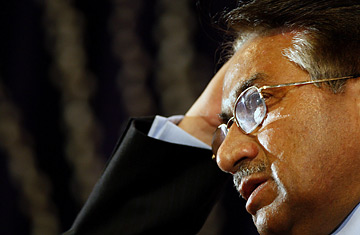
Pakistan's President Pervez Musharraf.
One week after parliamentary elections buoyed hopes for change in Pakistan, the country received a deadly reminder today that there is still a long and difficult battle ahead to end the growing tide of violence. A suicide bomber in the garrison city of Rawalpindi killed at least three people, including Lt. Gen. Mushtaq Baig, the army's top surgeon. Rawalpindi was also the site of the Dec. 27 assassination of former Prime Minister Benazir Bhutto. Today's attack, on a car carrying Baig, was the first since last week's election. Baig is the highest-ranking military officer to be killed in the wave of militant attacks that has hit the country's security forces and civilians over the past few years.
The attack comes as Pakistanis speculate over whether President Pervez Musharraf, whose party was humiliated in last week's polls, may be contemplating stepping down. The British newspaper the Sunday Telegraph reported an anonymous presidential aide saying that Musharraf would "quit within days, not months" so he can make "a graceful exit on a high." Separately, three U.S. Senators who met with Musharraf the morning after last week's election said that the President understands the message of vote results and might step down if offered a graceful exit, rather than impeachment. "I firmly believe if they [the new government] do not focus on old grudges — and there are plenty in Pakistan — and give him a graceful way to move," then it could happen, said Sen. Joe Biden, Chairman of the Senate Foreign Relations Committee.
Previous rumors that Musharraf was about to quit have proven false, and a spokesman said the President had no intention of leaving office. "This was not the presidential election. In these elections, people have selected candidates to represent them in the legislative assemblies," the spokesman told Indian newspaper The Hindu. "There is no reason for the President to quit." A Western diplomat agreed. "He's given no indication that he's going to do anything but see out his full five-year term," said the diplomat. "It doesn't seem to be in Musharraf's character to back away from a fight."
Yet a fight is what he might get if the new parliament's two biggest parties — the Pakistan People's Party (PPP) of assassinated former Prime Minister Benazir Bhutto and the Pakistan Muslim League-Nawaz (PML-N) of ex-prime minister Nawaz Sharif — push for Musharraf's impeachment or for the quick reinstatement of the Supreme Court he largely dismantled last November. Luckily for Musharraf, neither course is certain. The PPP and the PML-N, which are expected to form a coalition despite ideological disagreements and years of mutual enmity, would need to persuade one or two smaller parties to push their bloc past the two-thirds majority needed to launch impeachment proceedings. And while Sharif is calling for a return of the old judges, PPP officials seem more ambiguous on the point.
Much depends on how the negotiations go between the two big parties over the next week or so. When the new parliament sits for the first time next week, the PPP will nominate party loyalist Makhdoom Amin Fahim as Prime Minister, according to two party officials who asked not to be named because no official announcement has been made yet. Fahim ran the party inside Pakistan during Benazir Bhutto's years of exile and repeatedly turned down offers from Musharraf to leave the PPP and become premier by joining the then ruling PML-Q. After Bhutto's assassination late last year, the PPP leadership was handed to her widower Asif Ali Zardari and their 19-year-old son, Bilawal Bhutto Zardari, who has since returned to England to finish his studies. Asif Zardari did not run in the parliamentary polls, so he cannot be Prime Minister himself without winning a seat through a by-election, and even that may be a problem — not least because it's not clear he has a university degree, a prerequisite for election introduced by Musharraf.
Zardari has repeatedly said that he does not want the job. Still, the PPP leader may prefer Fahim to stronger rivals such as Aitzaz Ahsan, the charismatic and popular president of Pakistan's Supreme Court Bar Association. A senior member of the PML-N and friend of the PPP loyalist describes Fahim as "soft-spoken, not very decisive and more inclined to be led than to lead". That could be just the kind of man Zardari can work with.
